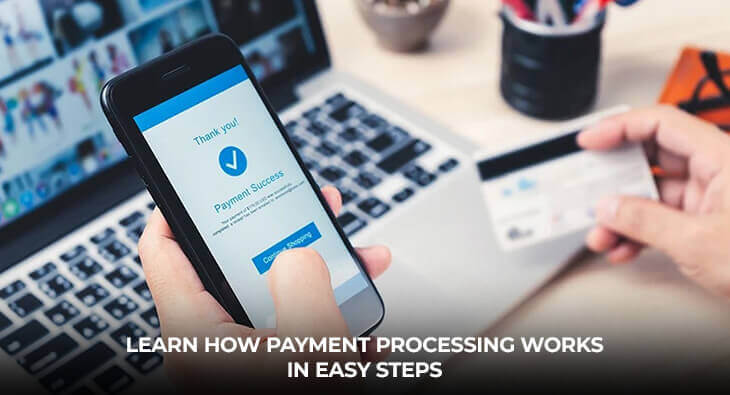The modern-day merchant must know the process of processing payments and be able to accept various types of payment if they’re planning to be successful in their business.
When customers would previously prefer payment with money or checks made by hand. The rise of online shopping and easy access to credit has prompted more people who can rely on more people to rely on debit and debit.
In the past, it was not uncommon to see businesses that did not accept credit cards however today. Even an artist who attends an arts and crafts festival is able to accept credit cards due to the advancement of technology in merchant portals.
What is Payment Processing?
A large part of this shift can be attributed to the growth of the industry of payment processing. The term “payment processor” refers to a business that facilitates transactions by transferring data between the customer’s bank as well as the credit card firm as well as the bank of the merchant.
When a person offers a payment method that is processed by the payment processing company. Its merchant portal helps facilitate the transaction through the verification of the financial information of the customer. Verifying any potential fraud After that. The funds are from the customer’s bank account to the bank account of the merchant.
If properly executed this process will take only several seconds to complete and allows businesses to collect their income quickly and conveniently. Payment processors are the preferred choice for merchants since they provide the “all-in-one” solution to their needs in terms of payment.
Instead of setting up multiple systems that facilitate payments from a variety of banking institutions. Merchants could utilize a single processing platform to connect to every one of them.
In certain situations. Especially in the case of businesses that operate in industries classified by the government as risky. Processors can offer more flexible terms than traditional banks and credit card businesses.
Related Blog
- Best Tips for Minimizing Payment Processing Fees
- Merchant Account And Secure Payment Gateway
- How to Start a CBD Business: Directing About CBD Industry
- Ways to know about your restaurant transaction business fees
- Sell Your Custom Nutraceutical Supplements Online
Types of Payment Processing
There are several commonly used types of payment processing Each provides a distinct payment option.
Credit Card Processing
Credit cards are typically issued by credit card associations or banks. When a consumer buys something with the card, the merchant needs to perform an audit of credit to make sure that the issuer covers the costs of the transaction and bills the cardholder.
A series of checks to prevent fraud should be conducted before the money is released. While this procedure is complex, however, it is able to be accomplished in a short time using advanced payments portals.
Credit card issuers generally charge processing fees, also known as interchange. This is a fee that can be paid in a matter of minutes. the majority of payment processors transfer to merchants. Certain payment processing companies cost merchants an additional markup cost as well as the exchange.
Debit Card Processing
For many people, making a purchase with a debit card is much easier than using a credit card since they do not have to worry about the transaction being accepted as long as they have money in their account at the bank.
The transactions made using debit cards are much easier and quicker to process for merchants due to the fact that the bank of the customer does not have to issue a credit for the purchase.
The buyer has either the cash available or do not. Some debit cards are able to serve as credit cards. However, and the distinction between them could be unclear if the user doesn’t clearly state which one they wish to utilize.
This can result in an enormous difference because debit card processing charges are typically much less than processing charges for credit cards.
eCheck Processing
Physical checks might not be as widespread as they were in the past but they’re still an option for payment for the majority of retailers. Businesses are able to accept checks without the need for payment processing. However, as long as they aren’t averse to having to travel to the bank in order to verify the check and deposit it in their bank account.
Apart from being an inconvenience. This method is also a way to avoid the possibility of the check getting returned or rejected due to inadequate funds. With the Processing of eChecks Merchants can swiftly scan the information on the check and send an electronic copy of it. If there are sufficient funds available for it. The transaction will be accepted immediately and the merchant is able to pay much more quickly.
How Payment Processing Works in 5 Easy Steps
The mechanics of the process of processing payments may be complicated however, with proper technology solutions put in place the process is rather simple.
![]()
Email us anytime!
Email customer service 24/7
![]()
Call us anytime!
Reach customer care 24/7 at +1 (727) 330-3944
1. Establish an account for merchants with the payment processing company.
A payment processing company such as Merchant Stronghold begins the process by establishing a merchant bank account. The account utilizes a merchant gateway portal that connects the points of sale with both the customer’s credit card issuer and bank. As well as the bank that is the merchants.
Although Merchant Stronghold doesn’t use them many processors do require high-risk enterprises to keep reserves or pay higher charges to guard themselves against charges or fraud.
2. The client presents the or her payment.
In-person or online the client pays for the goods or services they purchase through either a debit or credit card or a check. In the case of cash transactions, no processing is required.
3. The financial information is encrypted and transferred for authorization.
The transaction’s details such as the credit/debit card number. The number of scanned electronic checks, the amount of sale, and the amount are encrypted in the merchant gateway and then sent to the bank or credit card issuer to authorize. The process only takes two seconds and is utilized to guard against fraudulent transactions.
4. The sale is either approved or denied.
When the transaction information is received by the bank or credit card issuer the sale will be accepted or rejected. In the event that the card company suspects. That there is fraudulent activity or is unable to honor the transaction. They will not be able to let the money out.
The procedure is generally simpler for banks. Which simply needs to verify that the funds requested are in the bank’s account.
5. Funds are transferred to the seller.
When the credit issuer or bank approves the transaction. The money is released and transferred to the bank that is the merchant via their merchant gateway. This can take up to several days, but after the money has been transferred it is accessible for the retailer.
Get Paid Faster with Merchant Stronghold
As an all-in-one payment processing solution. Merchant Stronghold merchant gateway technology helps both low-risk and high-risk merchants get paid faster and easier than ever.
Our dynamic network of financial partners allows us to distribute risk more effectively and provide payment processing services with minimal transaction fees and no burdensome reserve or escrow requirements.


